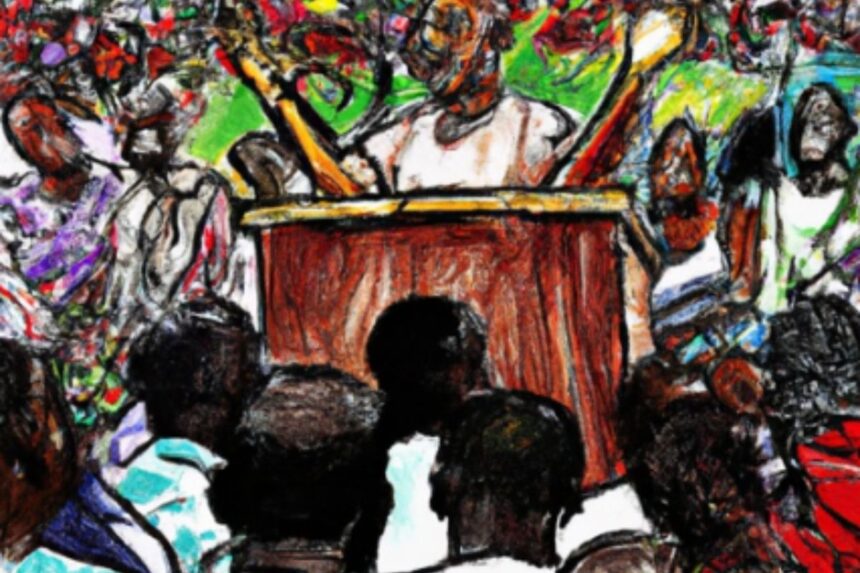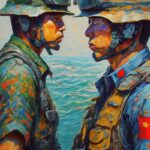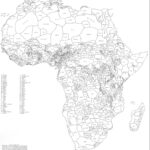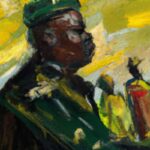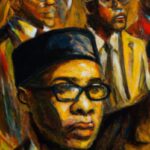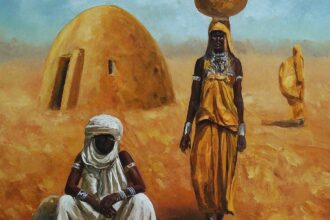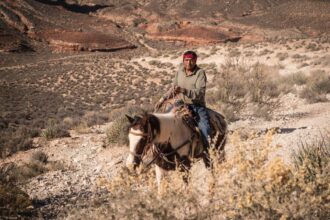Kwame Nkrumah’s journey from a humble town in the Gold Coast to the helm of Ghana’s leadership and, subsequently, as a beacon for Pan-Africanism, is a testament to the transformative power of education and the resilience of the human spirit.
Note
This duality of experiencing the rich traditions of his homeland while observing the overarching British influence likely instilled in young Nkrumah a deep sense of purpose and a quest for identity. Seeking to broaden his horizons and understand the world beyond the confines of colonial Africa, Nkrumah set sail for America in 1935. This decision was a transformative one. In the United States, he enrolled at Lincoln University in Pennsylvania, an institution known for its progressive ideologies and a history of nurturing African-American intellectuals.
Here, Nkrumah was not just exposed to Western academic rigor but also to the broader struggle of the African diaspora against racial prejudice and discrimination. It was during these formative years that he encountered the works and ideologies of Black intellectuals and activists like Marcus Garvey, W.E.B. Du Bois, and George Padmore. Their writings, emphasizing African pride, self-reliance, and the need for a united and liberated Africa, resonated deeply with Nkrumah. These interactions and learnings became the bedrock of his political and ideological framework.
However, Nkrumah’s educational journey wasn’t confined to formal academic learning. His stay in the U.S. also coincided with the Harlem Renaissance, a cultural, social, and artistic explosion centered in Harlem, New York. This movement, which celebrated Black culture and called for a renaissance of African heritage, provided Nkrumah with invaluable insights into the importance of cultural identity in the larger fight against oppression. His subsequent move to London further expanded his horizons. In the heart of the British Empire, Nkrumah furthered his studies, but perhaps more critically, engaged with fellow African students and leaders. This period witnessed the inception of the Fifth Pan-African Congress in 1945, where Nkrumah played a pivotal role. This congress was not just a forum for intellectual discourse but a clarion call for the decolonization of Africa.
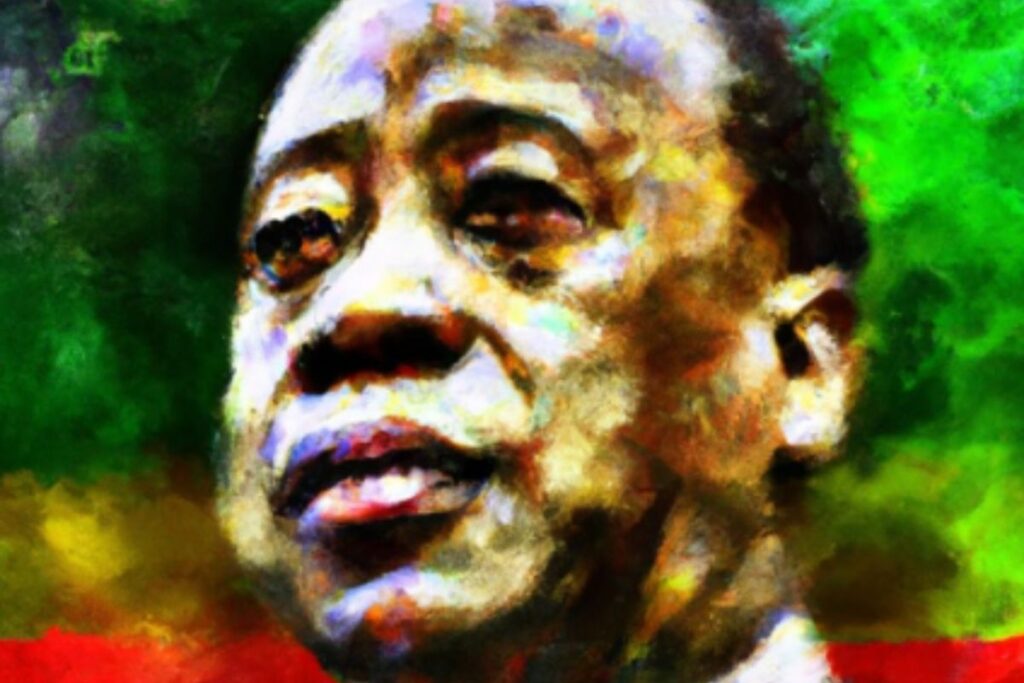
In essence, Nkrumah’s years of education and overseas stay were not just a phase of academic accumulation. They were, in fact, a crucible where a visionary leader was forged. The influences of Black intellectualism, the vibrancy of the Harlem Renaissance, the rigor of Western academia, and the passionate calls for decolonization coalesced to shape Nkrumah’s vision for a free, united, and prosperous Africa. It was with this vision and determination that he returned to the Gold Coast, ready to steer his nation and continent towards a brighter, self-determined future.
Kwame Nkrumah Return to Gold Coast: Mobilizing for Independence
Upon Nkrumah’s return to the Gold Coast in 1947, the political landscape was ripe for change. The colonial yoke had been weighing heavy on the African nations, and the winds of independence were beginning to blow across the continent. Armed with the knowledge and experience gained from his years abroad, Nkrumah was poised to take center stage in this unfolding drama of decolonization. His time in the West had not only equipped him with the intellectual tools but had also instilled in him an unwavering belief in the possibility of a free and united Africa.
Initially, Nkrumah aligned himself with the United Gold Coast Convention (UGCC), an organization that sought self-governance through constitutional means. However, it soon became apparent that the pace and approach of the UGCC were not congruent with Nkrumah’s vision. He believed in mass mobilization and direct action as the tools to achieve complete and immediate independence. It was this fundamental difference in ideologies that led Nkrumah to establish the Convention People’s Party (CPP) in 1949. The CPP’s motto, “Self-Government Now,” was not just a political slogan but a fervent call to action.
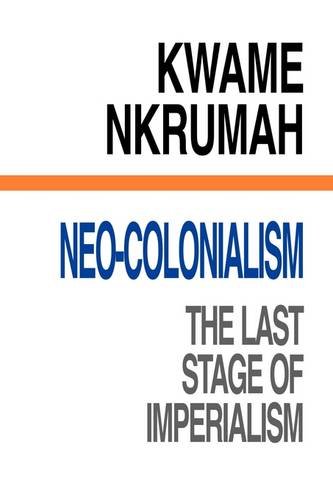
Kwame Nkrumah, Neo-Colonialism | The Last Stage Of Imperialism.
Under Nkrumah’s charismatic leadership, the CPP championed the cause of the common man. While the UGCC primarily comprised the elite, the CPP was a grassroots movement. Nkrumah utilized his deep understanding of Western political strategies and African communal ethos to mobilize the masses. Rallies, strikes, and civil disobedience campaigns became the order of the day. The British colonial government, initially dismissive of Nkrumah’s efforts, soon found itself grappling with a formidable political force. Nkrumah’s strategy was twofold: While he applied pressure through mass movements, he also engaged in negotiations with the colonial administration, showcasing his dexterity in balancing assertive activism with astute diplomacy.
However, this journey wasn’t devoid of challenges. Nkrumah faced incarceration multiple times due to his political activities. But, true to his indomitable spirit, each stint in prison only strengthened his resolve and bolstered his image as a martyr for the cause of independence. In fact, the 1951 general elections saw Nkrumah being elected while still in prison, a testament to his immense popularity and the trust the people of the Gold Coast had in him.
The culmination of these relentless efforts was the realization of Nkrumah’s dream on March 6, 1957, when the Gold Coast became Ghana, the first African nation south of the Sahara to gain independence from colonial rule. As the newly minted Prime Minister of Ghana, Nkrumah’s speech encapsulated his vision, “The independence of Ghana is meaningless unless it is linked up with the total liberation of the African continent.”
This phase of Nkrumah’s life is a testament to his political acumen, his ability to galvanize the masses, and his unyielding commitment to the cause of independence. The foundation laid during these years would go on to shape not just the destiny of Ghana but set the precedent for liberation movements across Africa.
Ghana’s Helm and the Pan-African Dream: Nkrumah’s Leadership and Vision
With Ghana’s freshly minted independence, Nkrumah was not one to rest on his laurels. The challenges of nation-building were vast, especially for a country that had just emerged from the shadows of colonial rule. However, for Nkrumah, the vision was clear — Ghana had to be the lodestar for African development and unity. To achieve this, he embarked on a two-pronged strategy: fostering rapid socio-economic development within Ghana and championing the cause of Pan-Africanism across the continent.
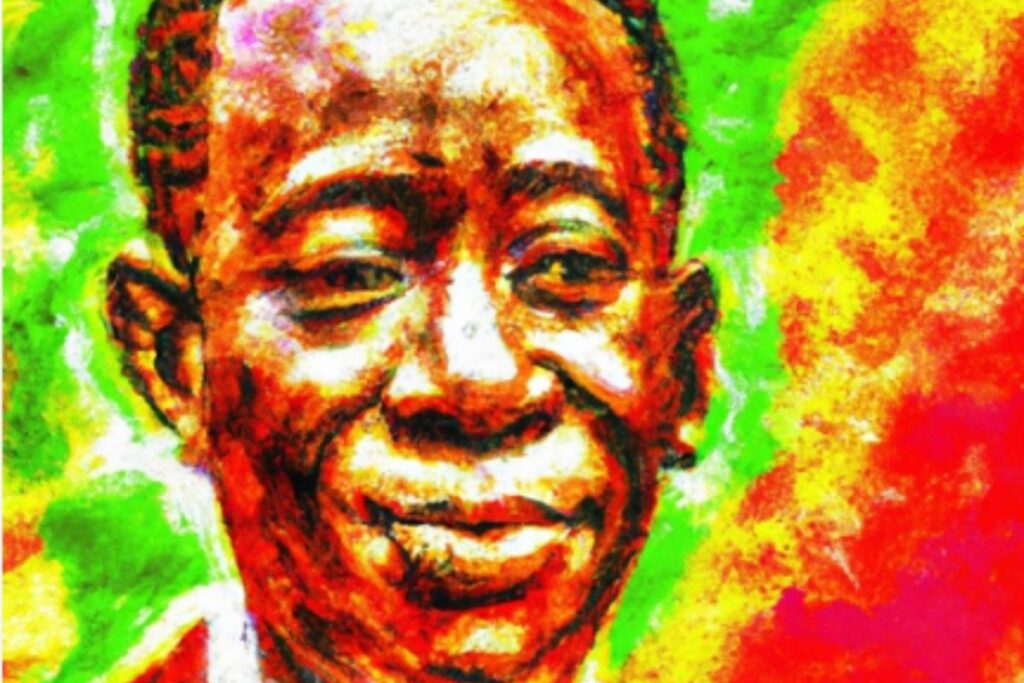
Within Ghana, Nkrumah’s ambitions were evident in the colossal infrastructural projects he undertook. Perhaps the most emblematic of these was the Akosombo Dam on the Volta River. Envisioned to supply hydroelectric power, the dam was not just about energy generation; it was a symbol of Ghana’s industrial aspirations. By harnessing its natural resources, Nkrumah aimed to reduce dependency on the Western world and chart an autonomous path to progress. Parallelly, efforts were intensified to boost cocoa production, leveraging Ghana’s prime position as a leading global producer. The establishment of state-owned enterprises was seen as a means to commandeer the nation’s economic destiny, emphasizing self-reliance and sustainability.
Education, for Nkrumah, was the linchpin to ensure Ghana’s long-term prosperity. The establishment of institutions like the Kwame Nkrumah University of Science and Technology underscored his commitment to fostering scientific and technological prowess within the nation. His belief was simple: An educated populace was essential for the growth, innovation, and governance of a progressive nation. Moreover, he initiated policies that expanded access to primary education, viewing it as a fundamental right, and ensuring that the next generation of Ghanaians would be equipped to further the nation’s aspirations.
However, Nkrumah’s vision extended beyond Ghana’s borders. He was a staunch advocate of Pan-Africanism, the ideology that underscored the interconnected destiny of all African nations. In the newly independent Ghana, Nkrumah saw a beacon that could light the way for the rest of the continent. He believed that the colonial divisions that fragmented Africa were artificial and that true strength lay in unity. His efforts in this direction were manifold. From providing support to liberation movements in other African nations to hosting the All-African People’s Conference in 1958, Nkrumah’s commitment to a united Africa was unwavering. This dream was further realized with the establishment of the Organization of African Unity (OAU) in 1963, a monumental step towards continental unity and cooperation.
However, like all visionaries, Nkrumah’s journey was punctuated with challenges. While his socialist economic policies were initially successful, by the mid-1960s, Ghana grappled with economic hardships. Externally, the Cold War politics played a role in shaping international perceptions and allegiances. Moreover, within Ghana, his move towards a one-party state and allegations of authoritarianism garnered criticism.
Yet, looking back, Kwame Nkrumah’s tenure as Ghana’s leader was transformative. His dual legacy of pioneering development within Ghana while fervently championing the Pan-African cause remains etched in the annals of African history. His vision, passion, and relentless pursuit of a united and prosperous Africa continue to inspire and resonate with generations.
The Latter Years: Challenges, Exile, and Nkrumah’s Undying Legacy
The trajectory of great leaders is rarely a linear ascent, and Kwame Nkrumah was no exception. As the 1960s progressed, the challenges facing him and his vision for Ghana and Africa grew increasingly intricate. Domestically, Nkrumah’s policies, particularly those of rapid industrialization and state control, began to strain Ghana’s economy. While projects like the Akosombo Dam showcased progress, the broader economy, heavily reliant on cocoa exports, faced volatility in global commodity prices. Economic hardships were exacerbated by droughts and a decline in cocoa prices, leading to significant deficits.
Nkrumah’s political approach also began to court controversy. His move towards a one-party state, ostensibly to maintain stability and national unity, was viewed by many as autocratic. The Preventive Detention Act, which allowed imprisonment without trial, was particularly contentious. While Nkrumah justified these measures as necessary to thwart neocolonial influences and ensure uninterrupted progress, they undeniably dented his image as a democratic leader.
Internationally, Nkrumah’s position was complicated by the geopolitics of the Cold War. His socialist leanings and emphasis on non-alignment placed Ghana in a precarious position between the Western and Eastern blocs. His passionate advocacy for African unity, while laudable, often clashed with the interests of other emerging African leaders, leading to a fragmented approach to Pan-Africanism.
In 1966, while on a diplomatic mission to Vietnam, Nkrumah’s leadership was abruptly truncated by a military coup back home. The coup, orchestrated by military officers with alleged CIA backing, marked the end of Nkrumah’s direct political influence in Ghana. Forced into exile, he found asylum in Guinea, a country led by his close ally and fellow Pan-Africanist, Sékou Touré. In Guinea, Nkrumah was appointed co-president and continued to passionately advocate for his vision of a United States of Africa until his untimely death in 1972.
Yet, in the annals of history, the essence of a leader is not solely defined by the challenges they faced or the offices they held. It is their vision, their passion, and the indelible marks they leave on the sands of time that truly matter. And in this regard, Kwame Nkrumah’s legacy is colossal. Today, his dream of a united Africa resonates through institutions like the African Union, which owes much to Nkrumah’s initial push for continental cooperation through the OAU. His emphasis on self-reliance and resistance to neocolonialism remain relevant in discussions on African development and global politics.
In Ghana, while debates continue about some of his policies, there’s no denying the foundational role he played in establishing the nation’s sovereign identity and development trajectory. His mausoleum in Accra stands not just as a tribute to the man but as a testament to an idea – the idea of a free, progressive, and united Africa.
To understand Africa’s post-colonial history, one must understand Nkrumah – his dreams, his struggles, and the enduring legacy he bequeathed to Ghana and the African continent.
Nkrumah’s Philosophical Contributions and Global Influence
Beyond the realms of politics and nation-building, Kwame Nkrumah was a profound thinker who contributed significantly to African philosophy and global thought. His writings and speeches reflect a deep-seated desire to ideologically liberate the African continent from the vestiges of colonialism and to carve out a unique, autonomous identity for Africa in the world.
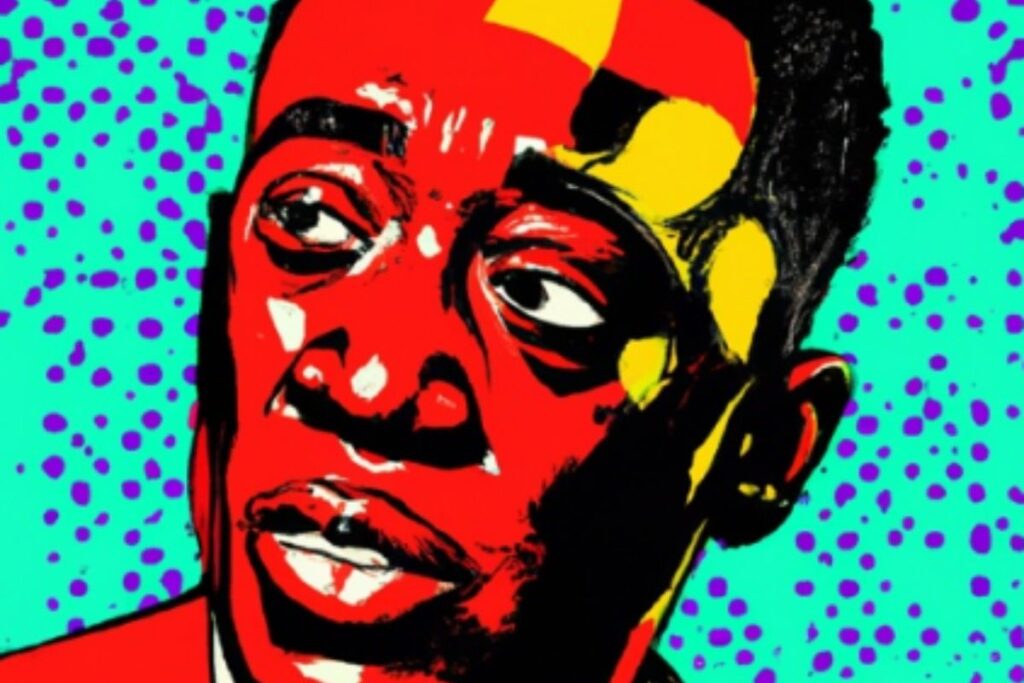
Consciencism:
One of Nkrumah’s most significant philosophical contributions is encapsulated in his work, “Consciencism: Philosophy and Ideology for Decolonisation.” Here, Nkrumah grapples with the challenges of a post-colonial African identity, deeply influenced by three distinct traditions: the African indigenous heritage, Western capitalist values, and socialist ideas. He proposed a synthesis, where traditional African communalism could meld with socialist principles to resist the exploitative tendencies of Western capitalism. At its heart, Consciencism was a call for a cohesive socio-political ideology that was rooted in African realities while being progressive in its outlook.
Neo-colonialism:
Another vital aspect of Nkrumah’s thought was his critique of neo-colonialism. In his seminal work, “Neo-Colonialism: The Last Stage of Imperialism,” Nkrumah argued that while African nations might have won political independence, economic control remained in the hands of Western powers. This economic dominance, exerted through multinational corporations, foreign aid conditions, and international financial institutions, was, for Nkrumah, the new face of imperialism. His warnings about neo-colonialism were prescient, and many of the economic challenges faced by African nations in the subsequent decades can be traced back to the issues he highlighted.
Global Non-Alignment:
On the global stage, Nkrumah was a staunch advocate for non-alignment. He perceived the Cold War as a continuation of imperialist rivalries and believed that newly independent nations, particularly in Africa and Asia, should not become pawns in this global chess game. Instead, these nations should chart their own course, promoting peace and focusing on development. His efforts in this direction were evident in his role in the formation of the Non-Aligned Movement, which sought to establish a “third way” in international politics, distinct from the Western and Eastern blocs.
African Unity:
As touched upon previously, Nkrumah’s vision of a United States of Africa was not just political but deeply philosophical. He believed that a united Africa would be better positioned to tackle the challenges of development, resist external interference, and play a meaningful role in global affairs. His vision was rooted in the belief in a shared African destiny, intertwined histories, and a common future.
In examining Nkrumah’s global influence, one sees echoes of his ideas in various liberation movements worldwide. From the Civil Rights Movement in the United States to anti-imperialist movements in Latin America, Nkrumah’s writings and speeches were a source of inspiration. Leaders like Martin Luther King Jr. acknowledged Nkrumah’s impact, and his influence extended to thinkers and activists such as Malcolm X, W.E.B. Du Bois, and Frantz Fanon.
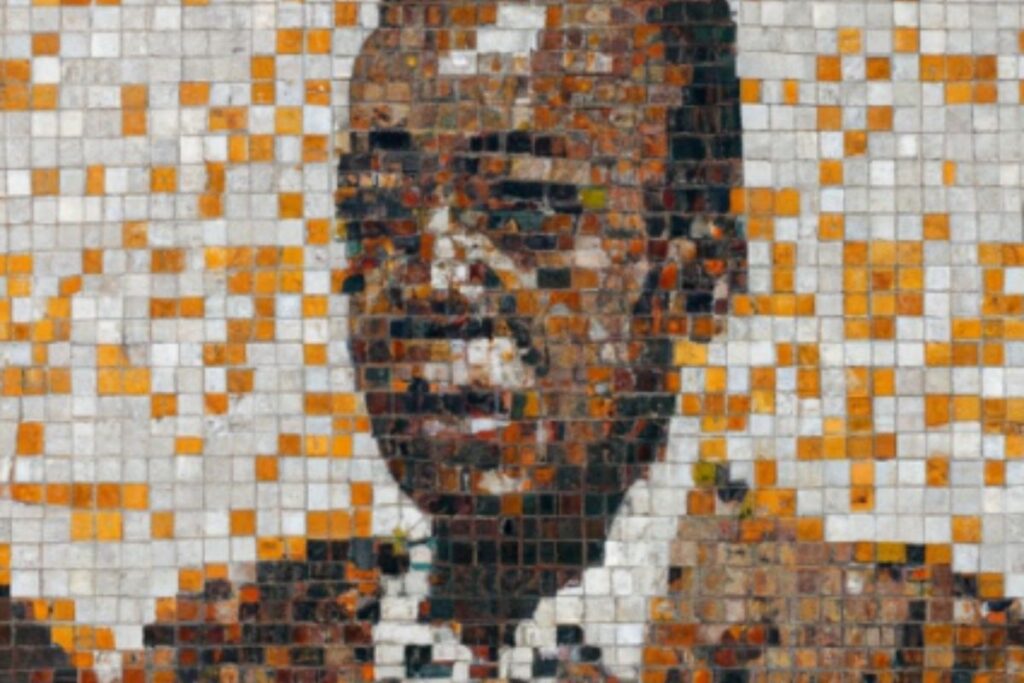
In summation, while Kwame Nkrumah’s political contributions to Ghana and Africa are monumental, his philosophical and ideological contributions have an equally enduring legacy. They serve as a beacon, guiding discussions on African identity, development, and the continent’s place in global geopolitics.








